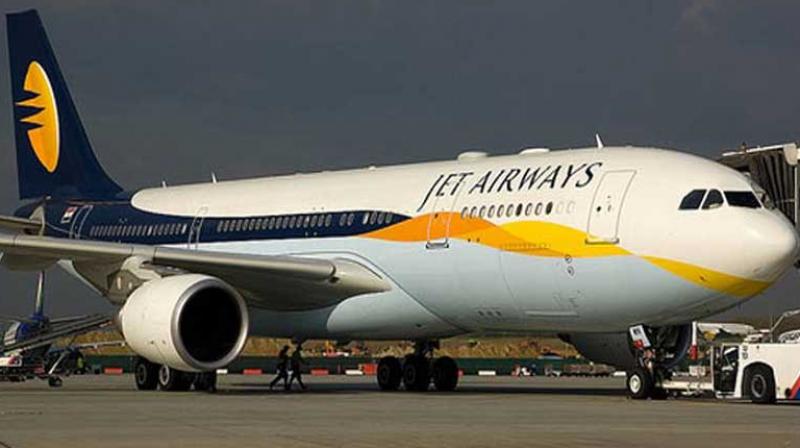Grounded Jet Airways\' shares sink, rivals race to grab airport slots
Investors punished Jet shares on Thursday, driving them down 34 per cent in their biggest intraday fall.

Mumbai: Jet Airways shares plunged on Thursday, battered by worries about whether the grounded Indian airline would fly again, while carriers such as SpiceJet rushed in to plug a supply gap in the wake of their rival’s demise.
Once India’s largest private airline, Jet halted all flight operations indefinitely on Wednesday evening after lenders led by the State Bank of India declined to extend more funds to keep the carrier going.
Investors punished Jet shares on Thursday, driving them down 34 per cent in their biggest intraday fall. The company is worth about USD 260 million now, versus USD 1.6 billion at its peak in 2005.
The carrier, saddled with roughly USD 1.2 billion of bank debt, has been teetering for weeks after failing to receive a stop-gap loan of about USD 217 million from its lenders, as part of a rescue deal agreed in late March.
While lenders are “reasonably hopeful” a bidding process for an up to 75 per cent stake in the airline will end successfully, investors - according to Shukor Yusof, the head of aviation consultancy Endau Analytics - have doubts over whether a successful deal will be completed.
Jet’s “value is dwindling with each passing day”, he said.
However, the crisis at Jet, long the biggest operator in Mumbai, has opened a window of opportunity for other airlines.
“Rivals are looting available slots because of Jet’s shutdown,” Edelweiss Securities analyst Vijayant Gupta said.
Jet’s slots will be allocated to other airlines based on factors including fleet and staff strength, a civil aviation ministry source said on condition of anonymity.
Once allotted, an airline can keep the slot for one flying season or six months and Jet can reclaim the slots if it is revived by the end of the flying season, the source said.
The current flying season ends on Oct. 26, according to the Indian aviation regulator’s website.
“We are assisting airlines and airports to bring in capacity rapidly to ensure that fares remain stable and competitive,” India’s Ministry of Aviation said on Twitter on Wednesday.
It is meeting with airports and airlines on Thursday.
A gap in capacity has pushed up fares by 30-40 per cent since September in India, ratings agency ICRA has said.
India’s biggest airline IndiGo has been rapidly inducting new Airbus SE A320neos into its fleet in recent months.
Low-cost airline SpiceJet Ltd has pledged to add 27 planes over the next two weeks, adding it would launch 24 new flights from Mumbai and Delhi over the period.
“The industry is currently facing severe shortage of capacity and SpiceJet remains committed to make all possible efforts to minimize passenger inconvenience,” said Ajay Singh, SpiceJet’s chairman and managing director.
SpiceJet shares rose as much as 15 per cent to the highest since February 2018 early on Thursday. Shares in IndiGo’s parent InterGlobe Aviation rose 3 per cent.
Lenders 'reasonably hopeful'
At its peak, Jet operated over 120 planes and well over 600 daily flights. The airline, which has roughly 16,000 employees, has in recent weeks been forced to cancel hundreds of flights and to halt all flights out of India as funds dried up.
“The best way forward for the survival of Jet Airways is to get the binding bids from potential investors who have expressed EOI and have been issued bid documents on 16th April,” Jet’s lenders said, referring to expressions of interest.
They added that they were “reasonably hopeful” the bid process will be successful in determining Jet’s fair value.
CNBC-TV18 reported on Tuesday that Jet’s lenders were set to invite binding bids from four shortlisted suitors that include private equity firms TPG Capital and Indigo Partners, Indian wealth fund National Investment and Infrastructure Fund (NIIF), and Etihad Airways, which already owns a minority stake in Jet.
Etihad did not respond to a request for comment outside usual business hours.
“Ultimately Jet’s share price will hinge on what sort of haircut lenders take. That will dictate the equity value of the company,” Edelweiss’ Gupta said.
Shares in Jet’s lead lender, State Bank of India, fell 1.9 per cent on Thursday.
Jet’s failure would be a blow to Indian Prime Minister Narendra Modi, who is currently seeking re-election in a weeks’ long general election. Modi’s critics blame his government for rising unemployment.
Lenders wanted to keep Jet operating but declined to extend the stop-gap loan to the carrier partly due to concerns over whether there had been any regulatory violations, a source at one of the banks said on condition of anonymity.
“We do not know right now if there are any regulatory violations in the company. If in the future someone finds that some rules were violated, then it could get us all in trouble,” the source said. “You do not know how these things work out.”

